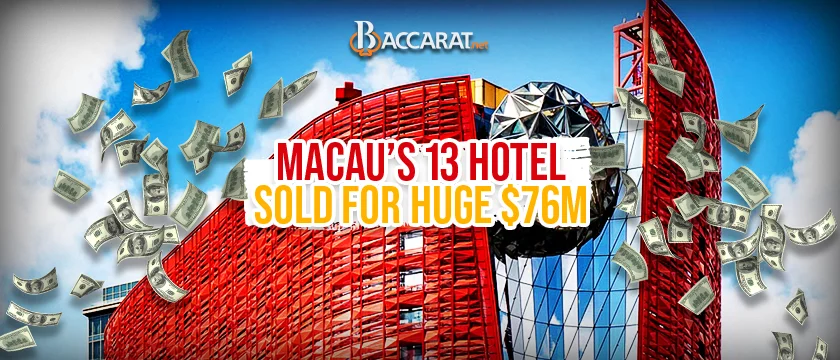New Owner Plans Revival of Macau’s Lavish 13 Hotel

Macau has long been synonymous with high-stakes gambling and luxurious experiences. However, as online baccarat grows in popularity, some of the autonomous region’s high-end properties have been suffering.
One such place is the extravagant hotel The 13 recently sold for HK$600 million (approximately US$76 million), in what might become a landmark moment in the property’s turbulent history. Despite the purchase price being well below the hotel’s original $1.4 billion development cost, it exceeded initial reports that predicted a sale of closer to HK$400 million.
A Doomed Resort for VIP Players
The 199-room luxury tower, located just south of Macau’s Cotai Strip in Cologne, was designed as an ultra-opulent retreat for high-rolling VIPs. It housed amenities such as 24-hour butler service, private elevators, ornate French interiors, and a fleet of 30 custom Rolls-Royce Phantoms painted in a color dubbed “Stephen red”. One of its suites famously had a nightly price tag of $127,400.
The hotel was the creation of Stephen Hung, a flamboyant Hong Kong financier and former Merrill Lynch advisor, who is known for his high-profile lifestyle and appearance on the Netflix series Bling Empire. He worked together with French royalty, Princess Tania de Bourbon Parme, and they aimed to build a hotel to rival the grandeur of Versailles. Unfortunately for Hung, his timing could not have been worse.
Construction began in 2013, the same year that Chinese President Xi Jinping launched a far-reaching anti-corruption campaign that dramatically reduced extravagant spending and put pressure on Macau’s VIP gambling sector. The crackdown, together with subsequent restrictions on capital outflow, caused severe damage to the city’s high-roller market, which is what The 13 had been built to serve.
Casino Deal Denied
A further setback came when The 13’s efforts to open a casino were denied. The hotel had originally planned to host a satellite casino with 66 gaming tables under a partnership with one of Macau’s six licensed operators. However, they failed to secure a deal, and without gaming revenue, the business model collapsed.
The hotel opened in August 2018 but remained operational for less than two years before closing in February 2020 at the start of the COVID-19 pandemic. It eventually went bankrupt in 2023. While the Macau Government Tourism Office reissued its hotel license last year, the property struggled to establish itself.
Hope for the Future
The new owner, an entity controlled by Loi Keong Kuong, who also owns the Rio Hotel in downtown Macau, acquired The 13 Hotel at auction. The Rio Hotel previously operated casino gaming under a partnership with Galaxy Entertainment, but this model has become less viable under Macau’s tightened satellite casino regulations.
While Loi’s new acquisition is not expected to include casino operations, there are ambitious plans to reimagine the property. Mark Wong, a senior manager at Jones Lang LaSalle (JLL) Macau, who brokered the sale, explained:
“The renovation will include introducing renowned restaurants from around the world, giving the property a fresh new look to attract visitors. This transaction reflects the ongoing recovery of Macau’s tourism industry and the new buyer’s strong confidence in Macau and commitment to driving industrial diversification.”
This diversification effort is in keeping with the broader strategy adopted by the Macau SAR Government, which in 2022 renewed the licenses of its six gaming operators, Sands, Galaxy, MGM, Melco, Wynn, and SJM, for another ten years. As part of that deal, the licensees agreed to invest more than $16 billion in upgrades and developments, with 90% of that earmarked for nongaming amenities. The government’s aim is to make Macau more appealing to families and non-gambling tourists, much like Las Vegas did in previous decades.
Though the original idea behind The 13 may have been to celebrate the high roller lifestyle, its new direction may help reshape the city’s tourism identity. As Wong put it, the property’s transformation “will remain a hotel and the buyer will invest and revitalise it.”



